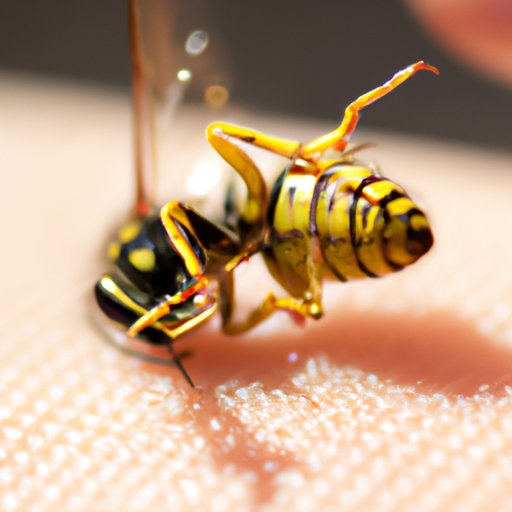
Introduction
While wasps are generally beneficial insects that help control other pests, their stings can be quite painful and even dangerous. Whether you’re an outdoorsy type, have kids who love to play outside, or simply come across a wasp at the wrong time, knowing how to treat a wasp sting is crucial. This article will provide you with all the information you need to properly treat wasp stings, including home remedies, tips for preventing stings, and medical treatments.
Symptoms and Identification of Wasp Stings
Wasp stings are typically painful and can cause redness, swelling, and itching at the site of the sting. In some cases, individuals may experience more severe symptoms, such as difficulty breathing or swallowing or even anaphylaxis, a potentially life-threatening allergic reaction.
To properly identify a wasp sting, look for a red mark or welt at the site of the sting, often with a small puncture mark in the center. If you’re unsure whether you’ve been stung by a wasp or another insect, observe the insect itself. Wasps are generally larger than bees and have slender, smooth bodies with a bright yellow and black coloring. Bees, on the other hand, are typically rounder and fuzzy with a brown and yellow coloring.
Home Remedies for Wasp Stings
If you’re dealing with a mild to moderate wasp sting, there are several home remedies you can try to alleviate the pain and swelling. These remedies include:
- Baking soda paste: Mix equal parts baking soda and water to create a paste, then apply it to the site of the sting. This can help neutralize the acidity of the wasp venom and reduce pain and itching.
- Vinegar: Soak a cotton ball in apple cider vinegar or white vinegar and apply it to the sting site for 15-20 minutes. This can help reduce inflammation and itching.
- Ice: Applying an ice pack to the sting site can help reduce swelling and numb the area to alleviate pain.
- Honey: Applying honey to the sting site can help reduce swelling and itching due to its antibacterial properties.
It’s important to note that while these remedies can be effective for mild to moderate stings, they may not be sufficient for more severe reactions. If you experience any concerning symptoms, seek medical attention immediately.
Tips for Preventing Wasp Stings
Preventing wasp stings is key in avoiding the pain and potential danger associated with them. Here are some tips to consider:
- Wear light-colored clothing: Wasps are attracted to dark colors, so wearing light-colored clothing can help deter them from landing on you.
- Avoid fragrances: Wasps are also attracted to floral or fruity scents, so avoid using heavily scented soaps, shampoos, or perfumes outdoors.
- Tuck in clothing: To avoid wasps crawling inside your clothing, tuck in shirts and pants and wear closed-toe shoes.
- Be careful when eating outdoors: Wasps are attracted to sugary and meat-based foods, so be sure to cover food and drinks when eating outdoors and dispose of trash properly.
- Stay calm when a wasp is near: If a wasp is flying near you, stay calm and don’t swat at it. Swatting or flailing can make the wasp feel threatened, increasing the likelihood of a sting.
- Stay away from wasp nests: If you know where a wasp nest is located, avoid approaching it or disturbing it in any way.
- Kill wasps safely: If a wasp is in your home or camping area, use a wasp-specific insecticide spray to kill it safely.
In addition, it’s important to know how to handle a swarm of wasps. If you find yourself surrounded by wasps, move calmly and slowly, avoiding sudden movements or loud noises. Try to find shelter indoors or in a nearby vehicle until the wasps die down.
Medical Treatment for Wasp Stings
If you experience more severe symptoms, such as difficulty breathing or anaphylaxis, seek medical attention immediately. Medical treatment for wasp stings may include:
- Antihistamines: These medications can help reduce swelling and itching.
- Pain medication: Over-the-counter pain relievers can help alleviate the pain associated with wasp stings.
- Epinephrine: In severe cases, a shot of epinephrine may be necessary to prevent anaphylaxis or other potentially life-threatening reactions.
It’s important to note that while medical treatment can be highly effective, it’s always best to take preventative measures and avoid getting stung in the first place.
Bee Stings vs. Wasp Stings
While bee and wasp stings are often used interchangeably, they’re actually quite different in both the symptoms they cause and the way they treat them. Bee stings tend to be less painful than wasp stings but can cause more severe allergic reactions. Wasp stings, on the other hand, are usually more painful but have less severe allergic reactions.
The treatment for bee stings typically involves removing the stinger, cleaning the site of the sting, and applying ice and/or hydrocortisone cream to reduce swelling. For more severe reactions, medical treatment may be necessary.
Real-life Stories and Cautionary Tales
Real-life stories and cautionary tales can drive home the importance of properly treating wasp stings. For example, a man in the UK recently died after being stung over 200 times by wasps while on a walk, highlighting the potential danger of wasp stings.
Another cautionary tale comes from the CDC, which reported a case of wasp sting-induced acute renal failure in an otherwise healthy 61-year-old man. While cases like this are rare, it’s important to know the potential risks associated with wasp stings.
Conclusion
Dealing with wasp stings can be painful and even dangerous, but with the right knowledge and preparation, you can avoid serious complications. By utilizing home remedies, following prevention tips, and seeking medical attention when necessary, you can effectively treat wasp stings and keep yourself and your loved ones safe.
Remember, if you experience any severe symptoms following a wasp sting, seek medical attention immediately. With proper treatment, you can quickly and safely recover from a wasp sting.





